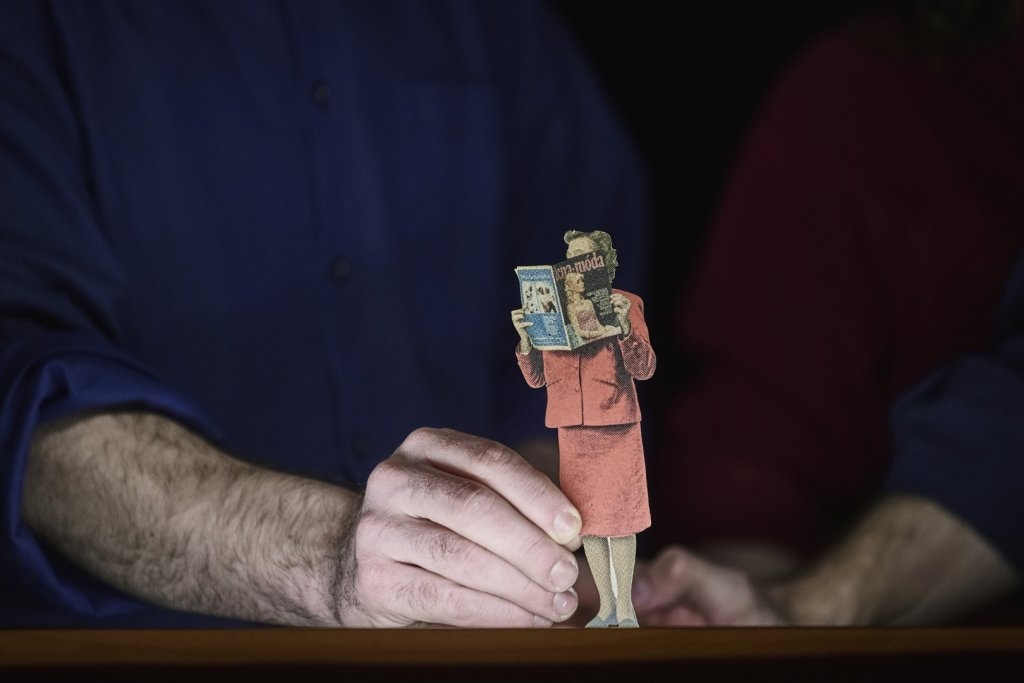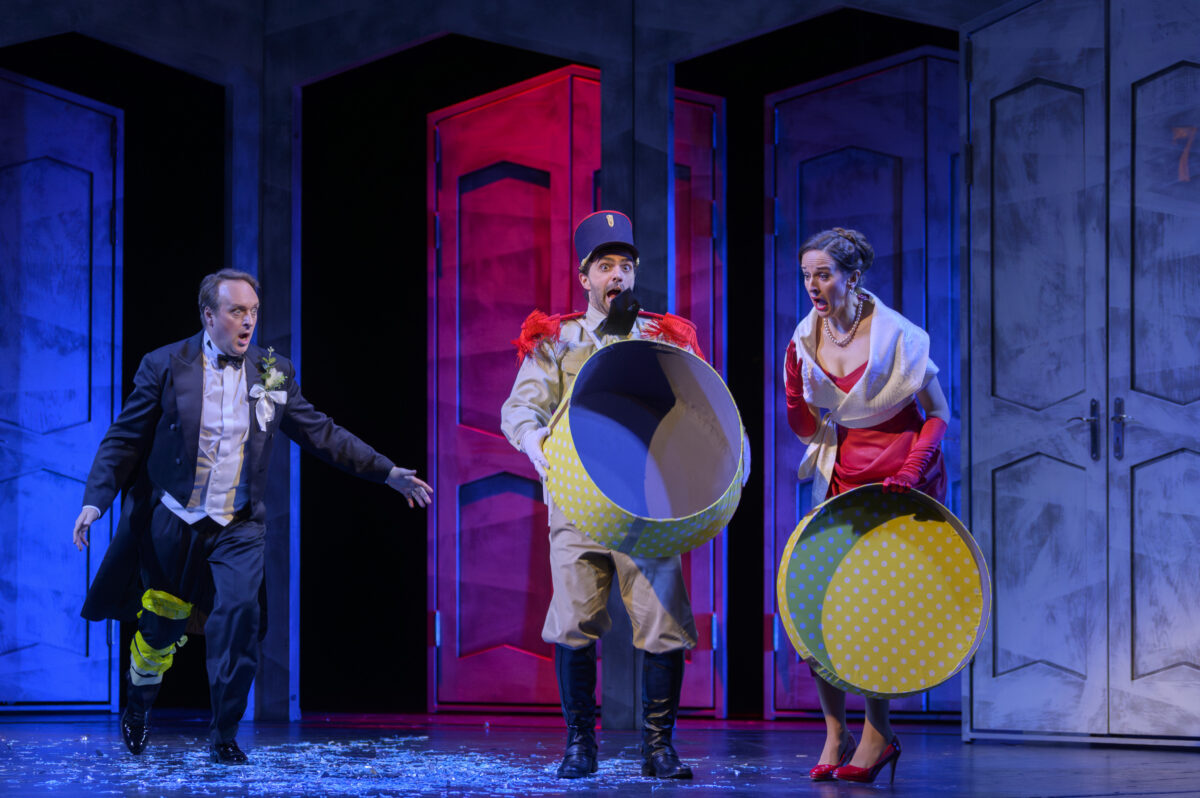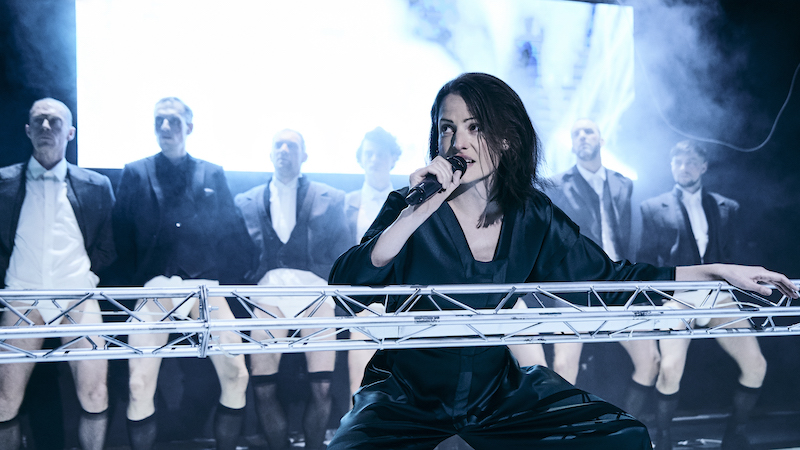Czech Dramatic Theatre 2019–2023
Imagery and Realism in Reflection of Present and Past Events
Even though dramatic theatre is not one of contemporary Czech culture’s primary items of export, the Czech Republic boasts a dense network of public theatres. They are not only concentrated in cultural capitals like Prague, Brno and Ostrava, but also in other towns and cities. Established by municipalities, they may be independent entities or dramatic theatre ensembles operating within theatres with multiple ensembles. The cultural offering of such venues is complemented by an independent scene, which, in the field of dramatic theatre, finds most of its audience in the capital city. Theatres with internationally accessible dramaturgy and aesthetics, or which collaborate more extensively with international partners (e.g. organising festivals, co-producing projects or delivering projects financed by European funds) include public theatres in Prague and Brno such as Theatre on the Balustrade, Pod Palmovkou Theatre, 1 Švanda Theatre, 2 Dejvice Theatre 3 and the Centre for Experimental Theatre and independent theatres such as THEATRE Letí, which concentrates on contemporary playwriting, the political theatre ensemble Lachende Bestien and, last but least, Archa Theatre, whose current team is leaving at the end of this season, which has advanced a strand of documentary and socially-engaged theatre.
A changing of the guard on the leading stage
The National Theatre in Prague is the only theatre in the Czech Republic established by the state. In recent years, under the artistic leadership of Daniela Špinar and the dramaturgical team of Marta Ljubková, Jan Tošovský and Nina Jacques, the nation’s leading stage established a practice of openness towards questioning the purpose of public cultural institutions through various forms of social discourse and not only through productions 4 and international collaborations. 5 There was also a change in personnel in the last season when the team led by Špinar was replaced by the directorial-dramaturgical duo SKUTR (Martin Kukučka and Lukáš Trpišovský).
Vassa Železnovová 6 (Vassa Zheleznova) was the most significant production of the 2021/22 season. Jan Frič staged the rarely performed 1910 version of Gorky’s text, which is harsher than the author’s later adaptation in line with the theories of social realism. On one hand, Frič’s production offers a portrait of a heartless entrepreneur, who destroys herself and those around her in pursuit of performance, which many saw as a metaphor for the Czech business environment of the 1990s and its social repercussions. At the same time, Frič’s non-judgemental production is sufficiently (un)sympathetic towards all the characters such that Vassa can also be interpreted as someone trying to achieve something in a situation where others mind their own business and merely profit from her efforts. The production was also formally impressive: the actors wore microphones, which allowed for subdued and intimate, yet detached, portrayals of emotional coldness. Frič has achieved an unprecedented collective synergy with the actors of the National Theatre,7 as was also visible in his previous projects there: a detective-style adaptation of Sophocles’ Oedipus, 8 a creative, large-scale production combining both parts of Goethe’s Faust, 9 and, above all, a chamber production of Ondřej Novotný’s text, Otec hlídá dceru 10 (The Father Watches Over the Daughter), touching on the topics of ageing, memories and generational responsibilities. Frič affirmed his position as one of today’s most thought-provoking Czech directors following the arrival of the drama company’s new leadership, when, in the spring of 2023, he presented Euripides’ Bakchantky (The Bacchae) 11 at the Estates Theatre. The production, which plays out as an unusual musical show (with the use of pop aesthetics of the 1960s and 70s) celebrates the intoxication of fame, theatre and success, while also dealing with harsh sobering up that inevitably follows every such “hallucination”.
The Brno Barometer
Goose on a String Theatre and HaDivadlo are among the most notable theatres active in Brno, the Czech Republic’s second-largest city. Both were leading ensembles of the studio theatre movement of the 1970s and 1980s, whose original, or “authorial,” work offered an alternative to the repertoire of most “official” theatres, which followed the dictates of the regime. Both theatres have recently gone through a generational shift, with the “founding fathers” and their associates replaced by artists several generations younger. This has brought about a transformation in the stage aesthetics, but the basic founding principle of both theatres, i.e. heightened attention to social topics and civic responsibility, remains unchanged. This is demonstrated by two of the newest productions – Goose on a String Theatre’s Vykouření (Smokeout) and HaDivadlo’s Humanismus 2022 (Humanism 2022).
Directed by Jiří Havelka, Smokeout 12 refers to an event five years ago, when Brno’s Theatre World Festival hosted the theatre ensemble Mladinsko Gledališče and their production Naše násilí a vaše násilí (Our Violence and Your Violence) by Croatian director Oliver Frljić, which contained various controversial elements including “scandalous treatment” of the national flag and a scene in which a character identifiable as Jesus rapes a Muslim woman. Slušní lidé (Decent People), a right-wing conservative group, attempted to prevent the performance from taking place, first disrupting it with noise and later creating a human chain on the stage. The Slovenian actors responded with an improvised dance and, after an intervention by the police, the performance continued. Subsequently, however, Cardinal Dominik Duka sued the festival organisers, because the mentioned Jesus scene supposedly restricted his right to religious expression and thus violated the Charter of Fundamental Rights and Freedoms. 13 A long trial finally concluded in 2022 when the Czech Constitutional Court did not find for the plaintiff. Havelka does not reenact the events – although he quotes from Frljić’s production, media responses and court documents – but references them to defend the symbolic and metaphorical nature of theatre. This is demonstrated in a scene where an actor standing on stage with arms outstretched in a familiar pose takes on different “meanings” depending on how others treat him. The production doesn’t seek to lampoon those who view things from a narrow ideological perspective (whether on the side of “good” or “evil”), but highlights theatre as a place dedicated to freedom and liberty, which requires the collaboration of an equally free audience to be effective.
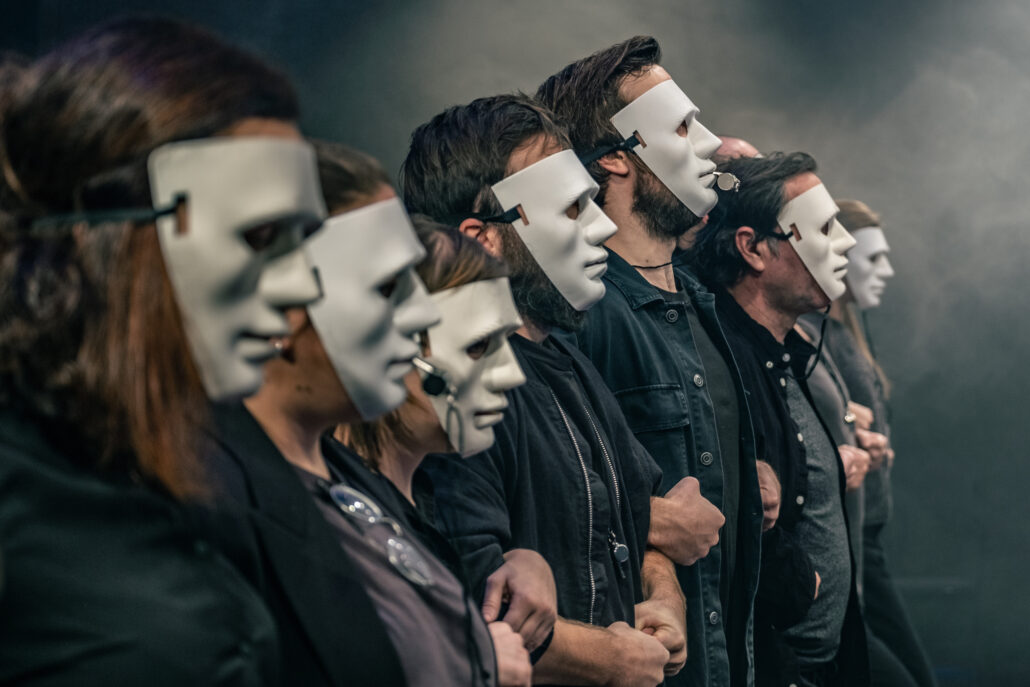
Humanism 2022, 14 a work created jointly by Ivan Buraj, an in-house director at HaDivadlo and film director and screenwriter Bohdan Karásek, prioritises the naming and examination of topics from the discourse of the younger generations over style and metaphor. At HaDivadlo, this primarily concerns the idea of degrowth, which has been part of the theatre’s dramaturgy for a number of years. The authors take five Czech tourists to an Airbnb in Venice, where they hope to enjoy a holiday, or perhaps escape the uncertainties of their everyday lives. It is not an “issue” production that seeks to point out a specific problem with a single example, but rather part of a series of productions, including Naši – Studie rozhovoru o klimatické krizi 15 (Ours – A Study of a Dialogue on the Climate Crisis) by Ivan Buraj, Bohdan Karásek and Pavel Sterec, that capture elements of the current mood and ways of thinking and leave it up to the spectator to take a position on them.
Echoes of War
Czech theatre also responded to the outbreak of war in Ukraine. Along with a number of staged readings and other events, productions involving Ukrainian artists who had fled to the Czech Republic also appeared such as Trójanky (The Trojan Women), 16 directed by Jakub Čermák, Než skončí válka (Until the War is Over), directed by Max Nowotarski at HaDivadlo and Nezlomní 17 (Unbreakable), an original production by Kostiantyn Zhyrov presented at Prague’s Divadlo X10. The same venue, which is notable for a rigorous dramaturgy that responds to current events, also presented Moskoviáda 18 (The Moscoviad) directed by Dušan D. Pařízek, a director active in Czech and German theatre. The Moscoviad does not directly respond to the Ukrainian war: it is an adaptation of Yuri Andrukhovych’s novel describing Ukrainian author Otto von F.’s absurd and surreal journey through Moscow in the period after the watershed year of 1989. In an atmosphere reminiscent of The Master and Margarita, he encounters typical remnants of the Soviet regime and emerging manifestations of the new capitalism, before ending up in an underground bunker, where various political zombies are plotting world domination. Pařízek manages to transport this fever-dream atmosphere to the stage without abandoning his typical approaches: understated acting, breaking of the fourth wall, a sense of the epic, and an austere, but functional set that is changed by the actors throughout the course of the production and features the use of overhead projectors. The production does not reference the current conflict, but instead offers a glimpse into the notional Russian soul, where the imperial ambitions of a great nation combine with the impoverished reality of ordinary people’s lives.
Konec rudého člověka 19 (The Last of the Soviets), directed by Michal Vajdička Jr. at Prague’s Theatre in Dlouhá Street, offers a clear parallel with Pařízek’s production. Playwright and dramaturg Daniel Majling based the work on Nobel Prize-winning author Svetlana Alexievich’s book, Second-hand Time: The Last of the Soviets, and translates the testimonies collected in this unique work into the story of a Russian family where highs and lows and fanatical beliefs in the Soviet and Russian empires collide with everyday realities and tragic fates shaped by twentieth-century history.
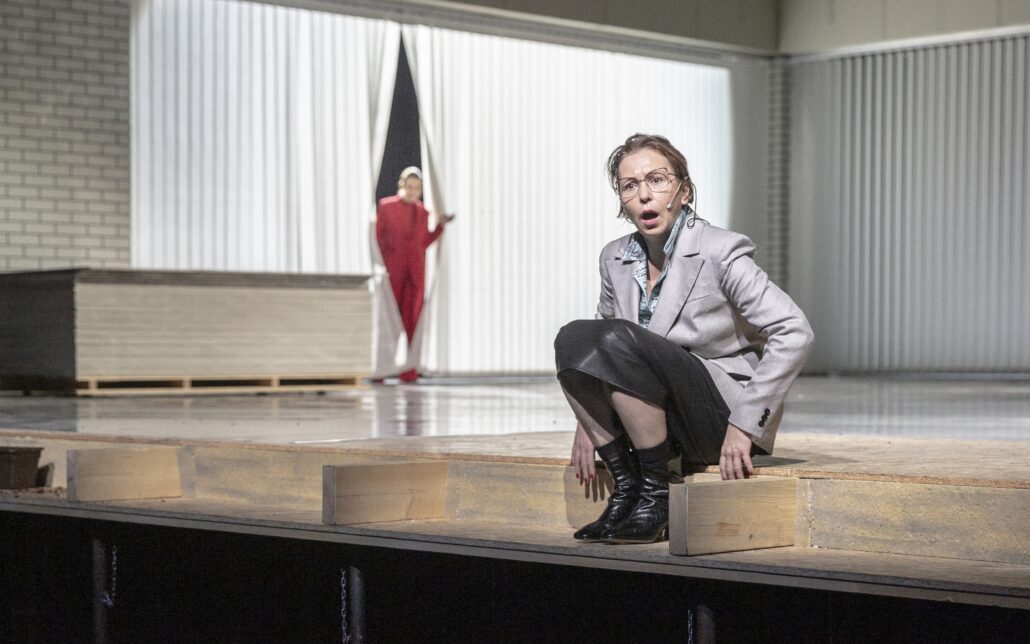
1 Since 2016, the theatre has organised Palm Off Fest, a meeting of Central European theatres.
2 During the SARS-CoV-19 pandemic, Švanda Theatre attracted attention with the Czech production of a play authored by artificial intelligence. The project was part of the 100th anniversary of the first production of Karel Čapek’s play R.U.R., in which the work ’robot’ was coined. AI: Když robot píše hru (AI: When a Robot Writes a Play), concept: Tomáš Studeník, direction: Daniel Hrbek, premiere 26. 2. 2021, Švanda Theatre, Prague.
3 Three theatre’s work under this heading: Goose on a String, HaDivadlo (see below) and Terén, a new, interdisciplinary performing arts platform.
4 E.g. ND Talks, a series of panel discussions a debates, and Emergency briefing, responding to current cultural or political issues.
5 Since 2016, the National Theatre Drama has organised the festival Pražské křižovatky (Prague Crossroads), which was created to honour the memory of former president and playwright Václav Havel. Continuing in his line, it presents theatrical productions from Europe and overseas that deal with human rights, socially urgent narratives and political topics.
6 Maxim Gorky: Vassa Železnovová, direction: Jan Frič, The National Theatre, premiere 27. 10. 2021, Enstate Theatre, Prague. The production was named Production of the Year by the Czech Theatre Critics Awards of 2021.
7 For more on this production and the topics mentioned above, see the English-language selection of articles from Svět a divadlo (World and Theatre) magazine, aka eWAT: www.svetadivadlo.cz.
8 Sofoklés: Král Oidipús, direction: Jan Frič, premieres 5. and 6. 12. 2019, The National Theatre, Prague.
9 Johann Wolfgang Goethe: Faust, direction: Jan Frič, The National Theatre, premieres 15. and 16. 3.2018, Estates Theatre.
10 Ondřej Novotný: Otec hlídá dceru, direction: Jan Frič, The National Theatre, premieres 17. and 18. 2. 2022, New Stage, Prague.
11 Euripides: Bakchantky, direction: Jan Frič, The National Theatre, premieres 16. and 17. 2. 2023, Estates Theatre, Prague.
12 Jiří Havelka and coll.: Vykouření, direction: Jiří Havelka, premiere 11. 11. 2022, Goose on a String Theatre, Brno.
13 The Polish production Prokletí (The Curse), performed by Warsaw’s Teatr Powszechny, which includes a scene where a statue of John Paul II with an erect penis is hanged, was also part of the lawsuit.
14 Ivan Buraj, Bohdan Karásek: Humanismus 2022, direction: Ivan Buraj, premiere 12. 11. 2022, HaDivadlo, Brno.
15 Ivan Buraj, Bohdan Karásek, Pavel Sterec: Naši – studie rozhovoru o klimatické krizi, direction: Ivan Buraj,premiere 31. 1. 2020, HaDivadlo, Brno.
16 Euripides, Jakub Čermák: Trójanky, direction: Jakub Čermák, Depresivní děti touží po penězích, premiere 10. 9. 2022, Venuše ve Švehlovce, Prague.
17 Konstiantyn Zhyrov: Nezlomní, direction: Konstiantyn Zhyrov, premiere 9. 10. 2022, Divadlo X10, Prague.
18 Jurij Andruchoyč: Moskoviáda, direction: Dušan D. Pařízek, premiere 18. 12. 2022, Divadlo X10, Prague.
19 Svetlana Alexievich, Daniel Majling: Konec rudého člověka, direction: Michal Vajdička, premiere 3. 3. 2022, Theatre in Dlouhá Street, Prague. The production was named Production of the Year in the 2022 Czech Critics Awards.
categories
Drama / Seasons’ overview
AUTHOR
JAKUB ŠKORPIL

 Learn
Learn

